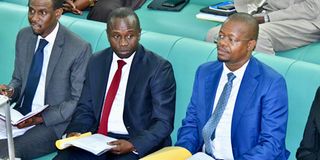Magogo, Kiwanuka find resolutions as Parliament passes Sports Bill

L-R: Attorney General Kiwanuka, sports minister Ogwang and Fufa president Moses Magogo were largely in harmony as parliament passed the new sports bill. PHOTO/DAVID LUBOWA
What you need to know:
Magogo maintained that federations be recognized by NCS as opposed to incorporation under the Companies Act. He noted on the floor that the current terms (2014 NCS Statutory Instrument No.34) that allow bodies to incorporate as trustees allows for warring factions to register multiple federations for one sports disciplines and that could continue.
Uganda, on Thursday, edged closer to a new sports law after Parliament agreed to pass the "National Sports Bill" that when assented to by the President will repeal and replace the 1964 National Council of Sports Act.
Most of the recommendations that brought closure were made by the Committee on Education and Sports, which was tasked with harmonizing the National Sports Bill 2021 - tabled by Hon. Moses Magogo on November 10, 2022 - and the Physical Activity and Sports Bill 2022 - tabled by the State Minister of Education and Sports on December 6 last year.
The Committee, which considered its own research and views of 26 federations plus other entities like Uganda Law Society, wondered in their report how government is planning to follow through with the Bill when the sports sub-sector has been previously under-funded and will see its budget cut from Shs47.81bn in 2022/23 to Shs17.39bn in the next financial year.
For example the National Recognition and Reward Scheme for sports personalities has not been provided for under the planned expenditure over the Medium Term Expenditure Framework.
The report also said that while the Attorney General Hon. Kiryowa Kiwanuka agreed with Magogo, MP for Budiope East and Fufa president, that provisions of arbitration in the latter's bill be incorporated in the government bill, he added that provisions on establishment of sports tribunals will not be catered for and that stood at the time for debate.
Incorporation of federations
Also despite late efforts from the Leader of Opposition Mathias Mpuuga, both Magogo and Kiwanuka could not be swayed in not criminalizing offences like unauthorized access to or participation in or production of sports events.
The two-day debate was lively throughout as its tone was set early on Wednesday when the two main protagonists shared ideas on issues to do with incorporation of national sports federations.
Magogo maintained that federations be recognized by NCS as opposed to incorporation under the Companies Act. He noted on the floor that the current terms (2014 NCS Statutory Instrument No.34) that allow bodies to incorporate as trustees allows for warring factions to register multiple federations for one sports disciplines and that could continue.
Kiwanuka argued that registering and incorporating under NCS defeats implementation of recommendations 24 and 25 of the Financial Action Task Force (FATF), an independent inter-government body, that promotes policies to protect the global financial system against money laundering and terrorists financing among others.
Kiryowa had further argued that while NCS can regulate federations, it does not have the legal mandate to curb the aforementioned vices.
But the shadow Attorney General Hon. Wilfred Niwagaba advised that there are other ways of creating legal personality while Bugiri Municipality MP Asuman Basalirwa said that political parties also beat the bureaucracy by registering directly with the Electoral Commission.
"One can register under one legal regime and operate under another. Businesses for example can be registered under the Companies Act and are regulated under the Trade Act.
But while it is legally possible for us to create new mechanism of granting legal capacity, we have already declared all methods methods for creating legal personality and we are on the FATF's grey list until June 2023," Kiryowa, who appeared to be in agreement with Magogo yesterday.
The future
The Speaker said the new law "is not cast in stone" and can be revisited in future if it causes any issues.
The Committee also got backing from Parliament that federations should declare the sources of their funds to avoid duplication of funding of activities by federations and to ensure there apre no ill motives behind such fundings.
The Bill as passed also allows for Uganda Olympic Committee and the anti-doping agency to continue operating in line with the Olympic Charter and as allowed by the World Anti-doping Agency respectively.
The House also passed that public sports infrastructure and land for public sports facilities be vested in National Council of Sports, which is not allowed to sell or mortgage them unless they have permission from the Minister.




